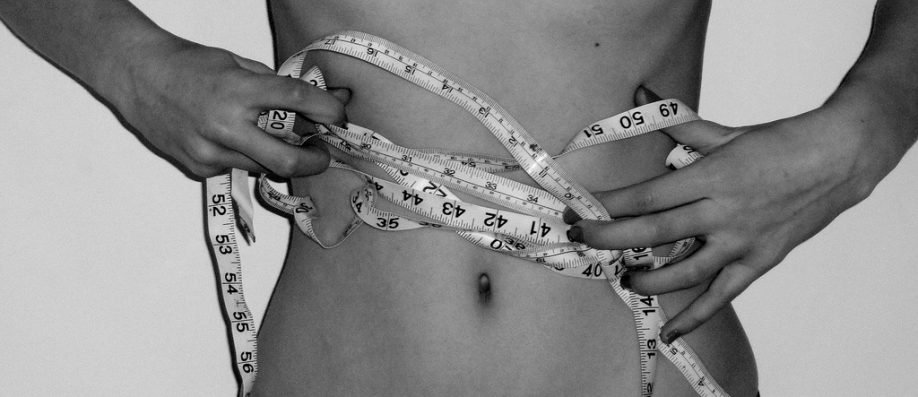by Courtney Morgan
While I mean what my title says, I’m not talking about the type of harm that may immediately spring to mind. I’m not talking about physical harm or violence. I’m talking about something that seems much more benign and innocuous. I’m talking about the daily, hourly, sometimes minute-by-minute attack I commit with my thoughts, my words, with my mental and emotional responses to other women’s bodies.
(And, let me be clear, I don’t mean to imply that this is as destructive as physical harm and violence; my goal is to examine the ways that this line of thinking contributes to a culture in which women’s bodies are just that–bodies, divorced from their human context; a line of thinking which ultimately leads to a generalized acceptance of and resignation to violence against them.)
I mean that in my daily walk through the grocery store, I may commit harm against dozens of women before I even pay for my milk. I mean the comparisons: “That girl has better calves than me, but bigger ankles.” I mean the jabs at the woman passing by me in the aisle: “With her thighs, she might want to rethink those shorts.” I mean the complicity in shaming celebrities in magazines: “Best and Worst Beach Bodies: Ooh, girl, time to check that cellulite and get back to the gym.”
And I like to think of myself as not (very) judgmental. Or what I mean is, I’ve been working on it for a very long time. It is hard for a fish to identify the water; we are swimming in a sea of judgment of women’s bodies and beauty. (And I’m not saying men are immune, but the stakes are much lower because “looks” are not the first and most important mark on the measuring stick we use to determine men’s worth in this society. They’re just not.)
This isn’t just a sea, though—it’s a shit-sea. And I am constantly adding to it with my own shitty thoughts and comparisons. “She’s skinny but her knees are knobby.” “I see a little tummy chub.” “She has better arms than me.”
I have these thoughts, almost constantly, about complete strangers as well as friends and family. I’m not trying to have them; in fact I try hard to quiet or ignore them, but on they go, spitting and shitting in the back of my head, evaluating everyone. Most times I’m not even conscious I’m thinking them until one catches my attention. And just because it’s all happening in my head doesn’t mean I’m not hurting anyone. Doesn’t mean I’m not buying into and contributing to this social narrative that women’s value lies in their looks.
“I like her hips.” “I wish I had her stomach.” “If only my boobs popped like that.” Even “positive” judgments can be harmful; we’re still valuing a stranger’s worth based on the shape of her outsides, her bones and skin—and we’re likely doing so at the expense of our own bodies, turning the shame in against ourselves.
I was raised in a house full of women and full of body image issues. Even the men in my family seemed obsessed with weight. I heard judgments and criticism everywhere, about celebrities, strangers, family members and myself. I watched friends and family members struggle with eating disorders. I consistently wrestled with body image issues myself. But I also loved sports—and because of that I developed a different relationship with my body. At an age where I was receiving an almost constant barrage of messages encouraging me to dissect and be disgusted by my body, I wanted it to be strong and fast. I appreciated what my body could do; I developed another mental framework for understanding and relating to my body, which conflicted with an overarching story I’d been seeing and hearing my whole life. A different way of relating to my body, which many women aren’t proffered.
Now, I have a lot of privilege around body type—I’m tall, I’m thin, I’m white, I’m cisgendered. I see bodies that look fairly similar to mine admired and desired in the media on a regular basis. And I understand how important that can be; what an impact it can have on ideas of self-worth. I recently watched a movie with a female protagonist who had small breasts (one of my own major body concerns), and when her body was portrayed as desirable, it was like it filled some need in me. It was like being loved. And in my head I thought how stupid and shallow that was. But that is how deep this goes.
And that’s the bullshit. I am tired of contributing to this social sense that we need to be loved by the media, by the masses, to be approved, in order to just exist. I’m tired of taking in these messages and spitting them out at other women. And I’m sorry. Sorry I’ve done it, consciously or not, all these years.
Neither athletics nor my privileged size made me immune to body image issues. I am, after all, still swimming in a sea of shit. I still need my body to be loved and accepted by society, because I have always been told that I need to have my body loved and accepted in order to be lovable and acceptable. Every woman has. If not by our parents, or our partners, then by the screaming, coercive, manipulative media—that old shit-sea.[1]
Someone I was dating once told me that it wasn’t his fault if he was naturally attracted to a certain body type; what was he supposed to do about it? My thoughts were that (one): he was being naïve (if not willfully ignorant) if he thought his attraction to a very typical standard of physical beauty was “natural,” and (two): if I had had the same stringent adhesion to a very specific physique, we might not have been dating at all. It’s not that there was anything “wrong” with his appearance; he just wasn’t the exact “type” I’d been previously drawn to. But I was attracted to his mind, his sense of humor, his kindness. There was far more to him than his shape and size.
“She’s fat.” “She’s skinny.” “She’s ugly.” “She’s pretty.” “Big elbows.” “Too many moles.” “Chunky thighs.” “Weird torso.” “Short neck.” “Cellulite.” “Flabby.” “Bony.”
I understand that most of these words are working as a shield, a way to protect my own fragile body image, and to hurl insults against it at the same time. Never good enough.
I’ve been aware of hearing these voices in my head for years. I’ve been swallowing this shit my entire life. And frankly, I’m just tired of it. The thing is, we don’t have to. We might not change the image of women projected in the media overnight. We might not change it EVER, to be perfectly frank. Women may always be objectified; women may always be judged based on their looks.
But me, I don’t have to raise another harmful thought or look or word against another woman’s body. This is not easy. It takes a constant vigilance. But I can make a commitment to challenging those internalized voices. Me, today, I’m going to start giving the love and acceptance that I so desperately want to every body I see.
(Let me also be clear here that I don’t mean to minimize eating disorders and body image issues–it is often not as simple as an act of willpower to stop or change internalized voices and certainly not to address a disorder or disease. This is just a practice I’ve been working on, for myself.)
There are enough people in this world committing real, physical and brutal acts of harm and violence against women’s bodies every day. I don’t need to contribute even one thought.
Now, when I hear one of the voices start up, I will choose to tell it to hush. I say to myself and to that woman, to every woman I see: “You are a beautiful human being.” The voices still come, they keep coming, but I just keep telling them, no, you’re wrong; she is a beautiful human being.
[1] This affects men too—the rate of males with eating disorders has been on a steep incline. But I’m also aware of having different set of thoughts when I see men around me. I have go-to, socialized responses to men that are vastly different than those that pop up for women. My responses to men typically fall into one of two categories, depending on the environment. The first category, passing someone alone at night on a sidewalk, for example, begins with an analysis of potential threat: how big he is, how fast, the distance of his body to mine, the aggressiveness of his stance. The second category arises in social situations where I feel secure; in this case, yes, I analyze a man’s body, along with his face, mannerisms and conversation for potential attraction. But the words in my mind are far less harsh than those I reserve for women’s bodies, and if they don’t fit into those two categories, most men’s bodies pass by me uncommented upon.
 Courtney Morgan is the founder and managing editor of The Thought Erotic. She also writes about sex, culture and all things literary at TTE and Vannevar. Her writing has appeared in Pleiades, The Red Anthology and American Book Review. She is a recipient of the Thompson Award for Western American Writing and was shortlisted for Glimmer Train’s Short Story Award for New Fiction.
Courtney Morgan is the founder and managing editor of The Thought Erotic. She also writes about sex, culture and all things literary at TTE and Vannevar. Her writing has appeared in Pleiades, The Red Anthology and American Book Review. She is a recipient of the Thompson Award for Western American Writing and was shortlisted for Glimmer Train’s Short Story Award for New Fiction.
Image: “Body Image” by Charlotte Astrid. Licensed Under Creative Commons Attribution 2.0.



2 thoughts on “Why I’m Choosing to Stop Doing Harm Against Other Women’s Bodies”